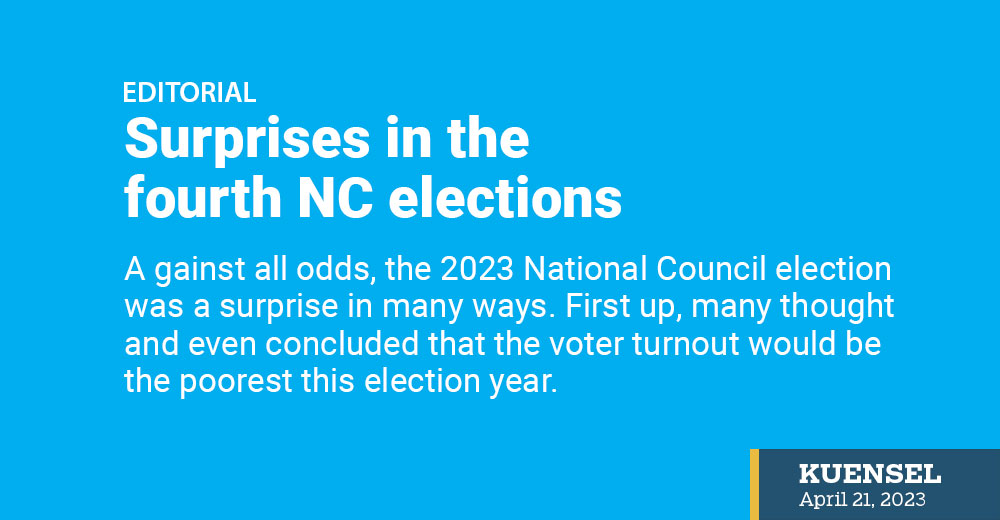Against all odds, the 2023 National Council election was a surprise in many ways. First up, many thought and even concluded that the voter turnout would be the poorest this election year. This comes on the heels of the restrictions on postal ballot and doing away with postal ballot facilitation booths. Many concluded and some were even waiting to prove the Election Commission of Bhutan wrong in their decisions.
Surprisingly, the voter turnout yesterday was the highest in the last 15 years. With nearly 55 percent voter turnout, out of 485,811 eligible, it was the most successful election in terms of voter turnout. It was 53 percent in the first election in 2008, 45.17 percent in 2013 and the record so far, 54.3 percent in 2018. Turnout could have been overwhelming if the voting facility in the 2018 elections continued into this election. And had it not been for mistakes in filling the postal ballot form leading to rejection, the turn out could have been higher.
The election yesterday also sprung another surprise when only two of the 10 incumbents were re-elected. Many say this was a call for change. As details of the elections are released, many would analyse the data. However, from the results yesterday, some conclusions are evident.
In Thimphu, the casual talk was that a “chance” should be given to the councilor-elect, as he had contested before. In other words, sympathy votes could have mattered in some dzongkhags. In Punakha, voters were openly talking about voting for MP-elect as he had contested for the last three elections, in vain.
Not to deride voters, many do not understand the role of NC members. They feel that they cannot pledge development activities, a priority for voters, and that “chances” should be given to others. In the Lhotsham speaking community, there is a maxim that talks about giving chances in turn, which is put into practice in electing leaders.
What is called sympathy votes, voting for candidates that had tried and failed before, also mattered in his election. In Thimphu and many other dzongkhags, the most convincing campaign was change or giving chance to new faces. The result, eight out of 10 incumbents lost.
One thing that has not changed in Bhutanese elections is the apathy for women candidates. Out of the five women aspiring candidates, only one got elected. The representation is poor. It should be a big concern both for voters and policy-makers. Perhaps, the legislators could take this up as an important issue in the Parliament. Out of the 90 aspiring candidates, only five were women.
It is said that Bhutanese voters are unpredictable. It will be difficult to predict what voters look at in electing leaders, but what is clear is that they will observe how they perform after reposing their trust in them. How well they do will be judged after another five years.


